- Home
- Sharon Sala
Remember Me Page 10
Remember Me Read online
Page 10
“No. No. I think that just about covers it,” Fornier said.
“All right, then,” Dawson said. “Good luck to you all.”
Fornier chuckled in the phone. “We’re going to need it.”
Dawson started to hang up when he realized Fornier was still talking.
“I’m sorry,” Dawson said. “What did you say?”
“Out of curiosity, when did Mrs. LeGrand show up?”
“Just a few days ago,” Dawson said.
“All right, and thanks again,” Fornier said.
Dawson disconnected, then sat, staring at the files strewn on his desk. The conversation wasn’t any different than others he’d had before, and yet there was something about it that bothered him. He went back over the words in his mind, volleying Fornier’s questions with his answers. It wasn’t until he got to the last part that it hit him. Why did it matter to Fornier when Francesca LeGrand was taken off the missing list? If she was here, she could not be there, certainly not in a morgue.
His gut clenched as he reached for the phone.
“Operator, I need the number for the Los Angeles Police Department. Yes, the main number will be fine.”
A few moments later, he was counting the rings.
“Los Angeles Police Department, how may I direct your call?”
“I’d like to speak with a Captain Fornier, please,” Dawson said.
“I’m sorry, sir, but there’s no officer by that name in this department.”
Dawson suddenly felt light-headed, as if he’d stood too abruptly.
“Are you sure?” he asked.
“Yes, sir,” the receptionist said. “I’m looking at the directory as we speak, and there’s no one here by that name.”
Dawson was shaking as hung up the phone. Even though the LeGrand case was technically active, he and Ramsey had come to a private conclusion that Francesca’s story about being taken from her home by force was all a lot of bull, especially since she’d returned under her own steam. But this phone call put another spin on the story. If she’d been telling the truth, he’d just given some very important information to a man who’d lied about his identity. The thought made him nervous. He got up from his desk and headed across the room to his captain’s office. If things were about to go sour, he didn’t want to be the only one in the know.
Eight
“How about that one?” Frankie asked.
The clerk at the gun shop arched an eyebrow. The woman might not know anything about guns, as she claimed, but she had a good eye. He lifted the small handgun from the case and laid it on the counter in front of her.
“Good choice,” he said. “Like the others I showed you, this is also a 9 mm Glock. It’s a G26 model, which is small and lightweight, making it easy to carry, and it fits nicely in your hand. And it fires eleven rounds, which is more than sufficient for normal protection. Here, hold it,” he urged. “See how it feels.”
Frankie picked it up, palming the grip and sliding her finger against the trigger.
“This one has the same features as the other Glocks you showed me, right?”
“What do mean?” the clerk asked.
“I mean about accidental firings, say, if it was dropped.”
“Oh, yes, of course,” the clerk said. “In fact, that’s the beauty of a Glock. It employs three internal safety mechanisms, all based on the trigger, remember? Simply put, it won’t fire if you don’t pull the trigger.”
Frankie nodded, looked down the barrel and took aim at a paper target on the opposite wall.
“Have you ever fired a gun before?” he asked
“No.”
“I highly recommend some lessons.” Then he smiled to soften what could be construed as criticism.
“I’m going to sign up at the Foothills Shooting Center in Lakewood. Do you know of it?”
“A good establishment. I’m sure you’ll get all the instruction you need there.”
Frankie nodded again. There was little more to be said, and truth be told, she was still a bit uncomfortable with the fact that she was seriously considering the purchase of a gun.
She looked at it then—at the way her fingers curled around the grip, the way it warmed from the heat of her body. The longer she held it, the more it began to feel like an extension of herself. It should have felt strange, even uncomfortable, but it didn’t. Instead, it balanced out her fears, making her feel as if she was on even ground with her faceless captors.
Then she shuddered. Even arming herself was no guarantee that she would be safe. There were too many unanswered questions. She couldn’t afford complacency until she had answers for her missing years. Simply owning a gun would not save her from future danger, but it did give her an emotional edge she badly needed.
She felt the clerk’s gaze, and for some reason was reluctant to face him. She hadn’t expected it, but there was a feeling of guilt associated with the purchase of a weapon. It was as if she was admitting to the world that her life was in disarray, and that she was willing to resort to violence to fix it.
Added to that, this was a big step she hadn’t discussed with Clay. Then she reminded herself that Clay wasn’t the one in imminent danger. She glanced out the window toward the car where Betty was patiently waiting, then took a deep breath.
“How much?” she asked.
“It’s six hundred and twenty-seven dollars, plus tax.” Then he added, “There’ll be a three-day waiting period before you can pick it up.”
She nodded. “I’ll be back.”
“That’s fine, then,” the clerk said. “I’ll need you to fill out some papers.”
She proceeded to do as he asked, and a short while later exited the gun shop. She gave her mother-in-law a nervous smile as she slid into the passenger seat.
“Did you do it?” Betty asked.
“Yes.”
“I hope you know what you’re doing.”
Frankie’s smile faded. “What I do know is that I’m never going to be a victim again.”
Betty’s eyes darkened with sympathy as she reached for Frankie’s hand and gave it a squeeze.
“I’m so sorry this has happened to you,” she said softly. “But I want you to be careful. People die daily from accidental gunshot wounds.”
Frankie’s lips thinned into a hard, angry line. “If I ever pull the trigger of a gun, it won’t be an accident.”
Betty paled. This was a side of Francesca she’d never seen.
“Could you? Kill someone, I mean.”
“If I felt my life or Clay’s was threatened, yes.”
“You’re that sure?”
“I’m that sure,” Frankie said, and then looked away.
They headed home in silence. Only when Betty was turning down the drive did Frankie speak again.
“Clay is already home,” Frankie said, then remembered to add, “Thank you for lunch and for chauffeuring me around.”
Betty parked, and gave Frankie a hug. “Oh, honey, it was my pleasure. When you disappeared, I grieved as if I’d lost my own child. Being with you like this is something I thought I’d never get to do again. All you have to do is ask.”
“I will, and soon,” Frankie promised. She exited the car on the run.
The wind was sharp. It felt like snow. She reached the door, her fingers shaking from the cold as she fumbled with the knob, but before she could turn it, Clay was standing in the doorway.
He smiled a welcome and pulled her into the warmth of the house, shutting the door behind her. “Come here to me,” he growled and opened his arms.
Frankie sank against him, snuggling her face against his red sweatshirt and savoring the strength of his embrace.
Clay rubbed his chin against the crown of her hair, loving the way she felt in his arms and thanking God that he was able to hold her once more.
“You and Mom had a pretty long day. Are you tired?”
She sighed. “Sort of, but it was good to be with her. I love her a lot, you know.”
He smiled. “Yeah, I know. She thinks you’re okay, too.” He pulled back enough that he could look at her face. “How about a hot bath before dinner?”
She nodded and then frowned as she remembered. “Oh, Clay, I didn’t even think of dinner or shopping for groceries. Do we have anything to cook?”
“It’s already done, so don’t worry,” he said.
Her shoulders slumped. “I’m not paying much attention to my side of the deal, am I?”
He frowned. “What deal?”
“You know, the one where you work and I take care of the house.”
“Even if it was only part-time, you were working, too,” he muttered. “Besides, who ever said anything about a deal, Francesca? What happens to you, happens to me, and vice versa. As far as I’m concerned, you should still be in bed, and you’re damn sure not going to start keeping house until you’re stronger.”
She managed a smile. “Okay.”
“Now, how about that bath?” Clay asked.
“You talked me into it,” she said. “I won’t be long.”
“Take your time, honey. The baked potatoes are still in the oven, anyway.”
She hurried away, ridden with guilt that Clay was doing all these wonderful things for her while she was going behind his back, keeping secrets. But she reminded herself that she wasn’t just doing it for herself, she was doing this for the both of them.
Sweat beaded across Pharaoh’s upper lip as he rolled over in bed. He reached for the rabbit’s foot, rubbing it between his fingers as he tried to block out the pain. Frustrated with his slow recovery from his injuries and the drowsiness the pain medication was causing, he had quit taking it a couple of days earlier. Now, while his mind was clear again, his body was objecting. He gritted his teeth and made himself focus on the small pair of Egyptian statues sitting side by side in an alcove in the wall opposite his bed.
Isis, in ancient Egypt, wife to Osiris and revered as mother of all things, lady of the elements, the beginning of time.
Osiris, resting right beside her, was, to the same ancient Egyptians, the ruler of the underworld, the prince of the dead.
Pharaoh clenched his teeth as another spasm of pain gripped his body. He closed his eyes, willing his mind to ignore the pain and to remember the world from whence he’d come. The rich, indolent world of ancient kings—the blast of desert sands and never-ending heat, the cool waters of the Nile and the shade of date palms. It was a lot easier to assimilate than facing the fact that he’d been abandoned at birth with no earthly idea of his lineage and raised in a New Mexico orphanage.
Within the madness of Pharaoh Carn’s mind, he’d settled the mystery of his birth by reincarnating himself from a world he’d never seen. And it had been his name, Pharaoh, that had given him the key to unlocking what he believed was his past.
Pharaoh touched the ankh tattoo in the middle of his chest as he stared intently at the statues, searching for himself in the features of their cold marble faces.
His mind jumped from his past to the present as Francesca’s image shifted through his mind. A muscle jerked at the side of his jaw as he tried not to picture her lifeless body lying nameless in some California morgue. And while his heart told him she was still alive, logic said otherwise. If she’d lived through the earthquake, they should have found her by now. And he’d sent Stykowski to Denver days ago and had yet to hear from the man. He gritted his teeth in frustration. The least the son of a bitch could do was call.
A knock sounded softly on the door.
“Come in.”
Duke Needham opened the door, but stopped in the doorway.
“Boss, I’m sorry to disturb you, but we’ve got trouble on the docks in Houston.”
Pharaoh’s mind quickly shifted from the personal to the business side of his life.
“What?” he snapped.
“It’s the DEA. They just confiscated the Little Egypt and everything on her.”
Pharaoh’s face flushed angrily. His personal yacht had always been off-limits. Someone in the DEA wasn’t earning the money Pharaoh was paying him.
“Help me up,” he muttered. “I’ve got some phone calls to make.”
Duke hurried to the bed and pulled his boss upright. “What do you need?” he asked once Pharaoh was on his feet.
“To get to my office,” he snapped. “Find that damned nurse and see what she did with the wheelchair.”
“Yes, sir,” Duke said, and left on the run.
A few minutes later, after ordering the permanent removal of one Dabney Carruthers from the face of the earth, Pharaoh hung up the phone.
“The little bastard,” he muttered. “I’ll teach him to fuck with me. I liked that yacht.”
Clay woke abruptly from a dreamless sleep, then rolled over in bed, casting a sleepy eye at the clock. 5:45 a.m. He hit the button on the alarm before it could go off and wake Frankie, then rolled back, snuggling beneath the covers for a few more minutes.
Frankie faced him as she slept, and he could just see the outline of her features, that delicate face with the china doll features framed by a thick tangle of black hair. He reached for her, wanting nothing more than the tenuous connection of skin against skin. But when he touched her, she moved toward him, snuggling her cheek against his chest and burying her nose beneath the covers.
His heart lurched. For a man as big and self-sufficient as he was, it was frightening to be this in love—to know that someone this small held such power over his life and happiness.
He wrapped his arms around her, loving the feel of her body next to his, knowing that this woman—this beautiful, fragile woman—was his wife. But his greatest fear came not in facing his weaknesses, but in knowing he had not protected her. He’d promised to honor her and keep her all the days of their lives, and he’d barely lasted twelve short months. That didn’t say much for his ability to keep promises.
He watched as Frankie shifted within his embrace, feeling her heartbeat and the softness of her breath against his skin. Inside his belly, an angry fire began to burn. He would honor his vows. He would take care of his own.
Frankie stood at the window, waving goodbye as Clay backed out of the driveway. Winston and Betty LeGrand’s second car was now parked on the street in front of their house, and there was a new cell phone on the hall table by the front door. Frankie let the curtain fall shut and turned away, absorbing the quiet. It was the first time she’d been alone since her return, and she didn’t know whether to be elated or afraid. In the back of her mind, the constant threat of the unknown continued to loom. However, Clay had done all he could to make sure she never felt stranded again. And while the car had given Frankie a sense of freedom, the phone was insurance for Clay. Now he could contact her anytime, anywhere, and assure himself she was safe.
Frankie stared at the living room in silence, debating with herself about going through with her plan. The gun she’d ordered was ready to be picked up. But was she ready to take this step? Not only was she lying to Clay, she was lying to herself. Yes, she wanted protection, but there was also a part of her that wanted revenge. Someone had stolen two years of her life. My God, why couldn’t she remember?
With a sigh, she headed for the kitchen, telling herself that she would do the dishes and start some laundry. There was still time to think about the gun. She could always change her mind.
She loaded the dishwasher, then wiped off the table and countertops. As she hung up the dishcloth to dry, her gaze fell on the small corner drawer where Clay had stashed the money they’d found in her clothes. In spite of last-minute nerves, she opened the drawer and took out the bills, staring at them as if at any moment they were going to explain their presence.
But nothing happened.
No flash of memory.
No revelation.
Frowning, she thrust the money back in the drawer. There was laundry that needed to be done. That was what she should be concentrating on, not complicating their lives even more by deceit.
&nb
sp; As she separated the clothes, her gaze fell on Clay’s Harley-Davidson T-shirt. It was old and faded and all but in rags, and it was her favorite nightshirt. She smiled and lifted it to her chest, hugging it to her and thinking of the man who was her husband.
When she’d worked at the library, she’d almost been jealous of the way her co-workers had acted when he would come to pick her up. Usually wearing clothes he’d worn on the job, the soft, faded denims and blue chambray shirts had molded themselves to his tall, muscled body like the fig leaf on Adam—covering what mattered, but leaving little to the imagination. His nose had been broken once in high school and had a slight bump on the bridge. His eyebrows were thick and dark and had a tendency to arc when he was intrigued. His chin was strong, with a stubborn thrust, and his eyes were a dark, brooding blue. But his bad-boy looks were deceiving. He was sexy as hell, but as faithful and honest as they came.
She sighed, then dropped the shirt into a pile with dark clothing and finished her task. A few minutes later, the washing machine was churning and the dishwasher was beginning the rinse cycle. She stood in the middle of the kitchen floor, looking for another task. Again her gaze fell on the kitchen drawer. She bit her lip and turned away.
“Focus,” she muttered, and moved into the living room and switched on the TV.
A talk show and seven commercial breaks later, she was no more settled than she’d been when she sat down. She glanced at the clock on the wall over the mantel. It was almost ten. Two hours before lunch. At least six hours before Clay would be home for dinner.
As the program ended, a brief news update came on the air, mentioning the possibility of snow before morning and then segueing into a report about the continuing cleanup of the devastating earthquake in southern California.
As the newscaster began to speak and the pictures flashed onto the screen, the skin on her body began to crawl. Blood drained from her face as she stared at the broken buildings and the devastation on the people’s faces.
“Run, Francesca, run!”
She jerked and turned, certain that someone was behind her, but there was no one there. She bolted from the sofa and ran to the door, making certain that it was securely locked, then went all through the house, repeating the procedure on all the other doors and windows until she was positive she was still alone.

 Blind Faith
Blind Faith Second Sight
Second Sight Count Your Blessings
Count Your Blessings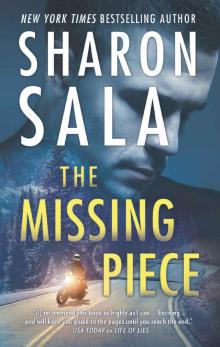 The Missing Piece (The Jigsaw Files)
The Missing Piece (The Jigsaw Files) Bloodlines
Bloodlines Sudden Danger
Sudden Danger King's Ransom
King's Ransom Once in a Blue Moon
Once in a Blue Moon A Rainbow Above Us
A Rainbow Above Us Always a Lady
Always a Lady Touchstone
Touchstone The Whippoorwill Trilogy
The Whippoorwill Trilogy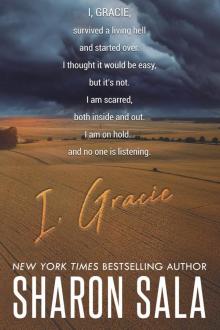 I, Gracie
I, Gracie Honor's Promise
Honor's Promise Rider on Fire
Rider on Fire The Gathering
The Gathering Don't Cry for Me
Don't Cry for Me The Way Back to You
The Way Back to You Swept Aside
Swept Aside Blood Stains
Blood Stains Chance McCall
Chance McCall Out of the Dark
Out of the Dark For Her Eyes Only
For Her Eyes Only 'Til Death (A Rebel Ridge Novel)
'Til Death (A Rebel Ridge Novel) Roman's Heart
Roman's Heart Snowfall
Snowfall Dark Hearts
Dark Hearts Mission: Irresistible
Mission: Irresistible A Place to Call Home
A Place to Call Home Betrayed
Betrayed The Lunatic Detective
The Lunatic Detective The Dove
The Dove Windwalker
Windwalker The Miracle Man
The Miracle Man The Curl Up and Dye
The Curl Up and Dye Familiar Stranger
Familiar Stranger Sweet Baby
Sweet Baby The Boarding House
The Boarding House Bad Penny
Bad Penny Remember Me
Remember Me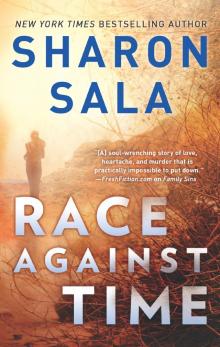 Race Against Time
Race Against Time The Dove (Prophecy Series)
The Dove (Prophecy Series)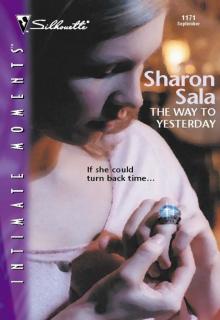 The Way to Yesterday
The Way to Yesterday The Healer
The Healer The Color of Love
The Color of Love Missing
Missing Next of Kin
Next of Kin A Field of Poppies
A Field of Poppies Cold Hearts
Cold Hearts Deadlier than the Male
Deadlier than the Male Color Me Bad: A Novella
Color Me Bad: A Novella Lunatic Times Two: 4 (The Lunatic Life Series)
Lunatic Times Two: 4 (The Lunatic Life Series)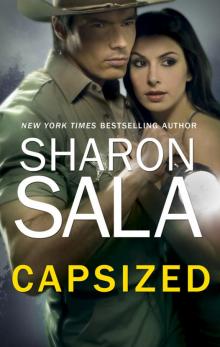 Capsized
Capsized Sympathy Pains
Sympathy Pains ROYAL'S CHILD
ROYAL'S CHILD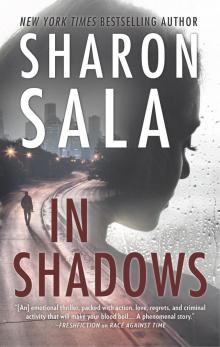 In Shadows
In Shadows 3, 2, 1...Married!
3, 2, 1...Married! Family Sins
Family Sins The Chosen
The Chosen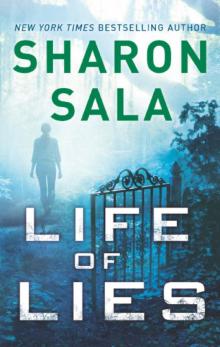 Life of Lies
Life of Lies Lunatic Revenge
Lunatic Revenge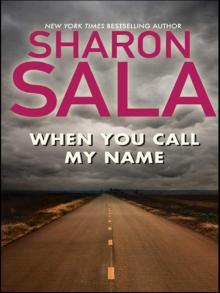 When You Call My Name
When You Call My Name I'll Stand By You
I'll Stand By You Saving Jake
Saving Jake Going Gone
Going Gone ANNIE AND THE OUTLAW
ANNIE AND THE OUTLAW Butterfly
Butterfly Cut Throat
Cut Throat Ryder's Wife
Ryder's Wife The Hen House
The Hen House Amber by Night
Amber by Night The Amen Trail
The Amen Trail Mimosa Grove
Mimosa Grove Dark Water
Dark Water Wild Hearts
Wild Hearts Blood Trails
Blood Trails The Warrior
The Warrior Shades of a Desperado
Shades of a Desperado Going Twice
Going Twice A Piece of My Heart
A Piece of My Heart You and Only You
You and Only You Nine Lives
Nine Lives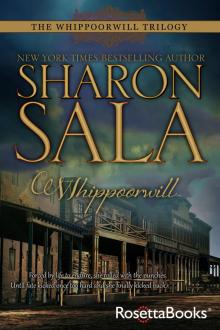 Whippoorwill
Whippoorwill